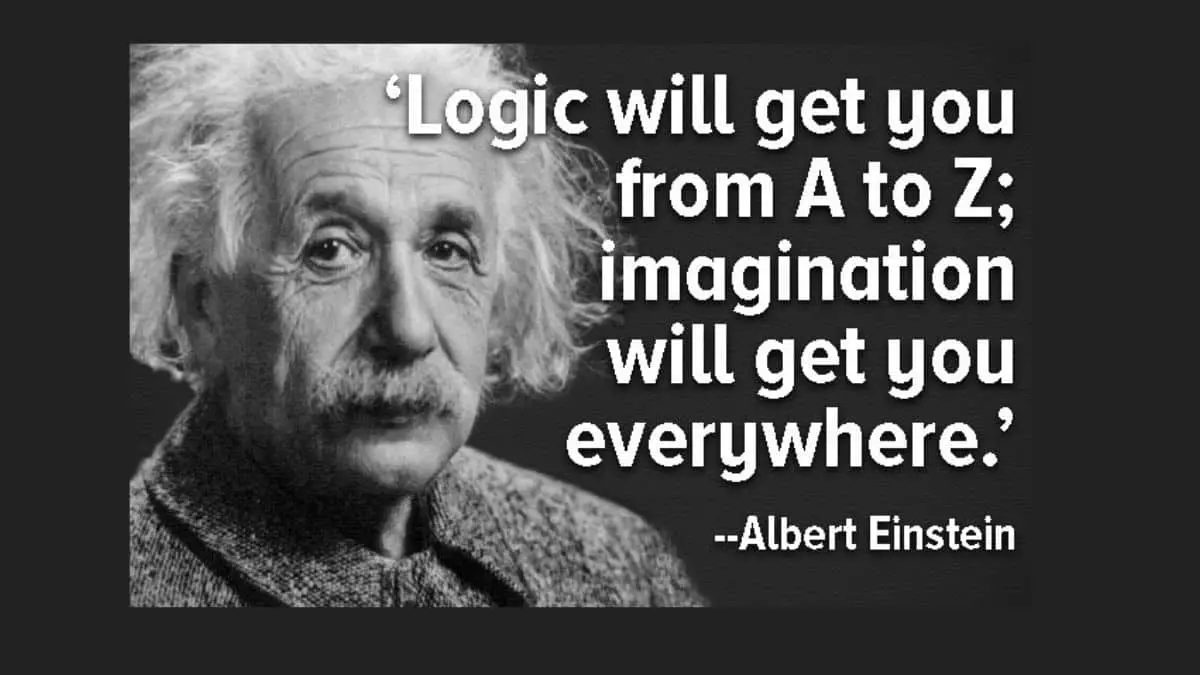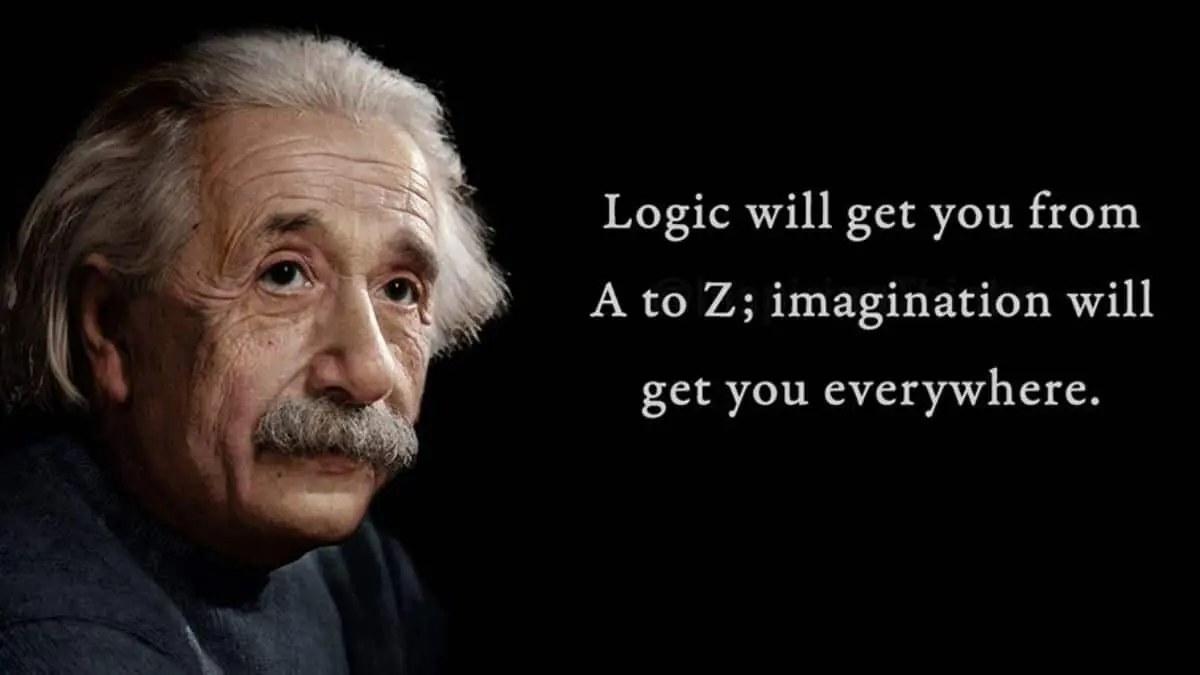In a world governed by rules and structures, logic is the tool we use to navigate through life’s complexities. It allows us to organize thoughts, make decisions based on evidence, and build upon the known. Yet, there is a horizon beyond which logic cannot see, and it is here that imagination takes flight. Imagination is not just the domain of artists and writers; it is the crucible of scientific revolutions, the mother of invention, and the silent power behind every leap into the unknown. “Logic will get you from A to Z; imagination will get you everywhere.” This profound statement, often attributed to Albert Einstein, serves as a beacon for thinkers, dreamers, and innovators alike. It suggests that while logic is crucial for systematic progression and problem-solving, it is imagination that propels us into the boundless possibility.
Logic will get you from A to Z; imagination will get you everywhere
The Role of Logic
Logic forms the very foundation of rationality and systematic thinking. It’s a tool that has been developed and honed through centuries of philosophical thought, scientific endeavor, and practical problem-solving. Logic is the framework upon which civilizations build their knowledge, create technologies, and establish systems of law and order.
The Essence of Logical Thinking
Logical thinking is characterized by a progression of thoughts, where each step follows from the last in a reasonable manner. It allows us to make sense of complex issues by breaking them down into more manageable parts. This section could delve into the history of logic, from Aristotle to the modern-day application in computer sciences.
Logic in Everyday Decision Making
Every day, we use logic to make decisions. From the mundane to the life-changing, logical thinking helps us weigh pros and cons, consider the consequences of our actions, and make choices that are coherent and justifiable. You could explore examples such as strategic planning in business, troubleshooting in technology, or even planning a family budget.
The Power of Logic in Science and Mathematics
The scientific method itself is a testament to the power of logic. Hypotheses are formed based on observations, and experiments are designed to test these hypotheses in a logical, structured manner. Similarly, mathematics is the language of logic, providing a formal system of rules through which we can express ideas precisely and unambiguously. This could lead to a discussion on how logic underpins every scientific and mathematical discovery.
Logic in Programming and Artificial Intelligence
In the age of information, logic has taken on a new form in programming and artificial intelligence. Algorithms are logical sequences that instruct computers to perform tasks, solve problems, and even learn from data. Here, the Blog could explore the logical underpinnings of algorithms, machine learning, and their implications for the future.
The Role of Logical Fallacies
An interesting angle to consider is the role of logical fallacies in thought processes. Despite our best efforts, humans often fall prey to errors in reasoning. Understanding logical fallacies helps us recognize these mistakes in ourselves and others, leading to clearer thinking and better arguments.
Logic as a Tool for Critical Thinking
In a world teeming with information and misinformation, logic is the tool that helps us discern truth from falsehood. It is at the heart of critical thinking, enabling us to analyze arguments, identify biases, and challenge assumptions. This section could provide tips on how to cultivate a more logical approach to information consumption.
The Limitations of Logic
While logic is indispensable, it is not infallible. It operates within the boundaries of our knowledge and assumptions. When we encounter new or unprecedented situations, logic may fall short, and this is where imagination steps in. This transition could serve as a segue into the next section of your blog, which will discuss the power and necessity of imagination.

Imagination as a Human Power
Imagination is the canvas of the mind where creativity takes shape, dreams are constructed, and innovations are born. It is a uniquely human power, allowing us to venture beyond the tangible and explore the realms of the possible and the yet-to-be-conceived.
Defining Imagination
Imagination is often seen as the ability to form mental images or concepts of what is not physically present or has never been actually experienced. This mental prowess is not just about visual pictures; it encompasses all senses and the capacity to conceive of new ideas. This section can delve into the definitions provided by psychologists and how imagination is seen through the lens of cognitive science.
The Wellspring of Creativity
At the heart of every artistic masterpiece, every piece of music, and every literary work is the spark of imagination. It’s what allows artists to create worlds that enchant and entertain us. In this part, you could discuss the importance of imagination in the arts, showcasing examples from literature, visual arts, and music.
Imagination and Innovation
History is replete with tales of inventors and scientists who imagined possibilities that defied the logical constraints of their time. From Leonardo da Vinci’s flying machines to the conceptualization of the smartphone, imagination has been the precursor to invention. Profiles of historical and modern figures who used their imagination to change the world would illustrate this point vividly.
The Role of Imagination in Problem-Solving
Imagination is not just for creating new things; it is also crucial for solving problems. When logic tells us that we’ve exhausted all options, imagination can see a path forward. This section could explore how reimagining a problem can lead to innovative solutions in various fields, such as business, environmental issues, and social challenges.
Imagination in Education
Modern education often emphasizes rote learning and standardized testing, but there’s a growing movement to give imagination its due credit. Discuss how education systems can nurture imagination, and the benefits of doing so, to help develop well-rounded individuals who can think outside the box.
Imaginative Play: The Foundation of Learning
Childhood play is often the first expression of imaginative power. Through play, children learn about the world, themselves, and how to interact with others. This section could explore the developmental benefits of imaginative play and how it lays the groundwork for complex cognitive functions.
The Future: Imagination as a Driver of Progress
In the ever-accelerating race of technological advancement, imagination is what drives us forward. Speculative fiction often precedes real innovation, and in this part, you can discuss how imagining different futures can help us prepare for and shape them.
Cultivating Imagination
Finally, provide readers with advice on how to cultivate their imagination. This could include practices like reading, daydreaming, engaging in creative hobbies, or simply allowing oneself the time to explore new ideas without the constraints of immediate practicality.
Conclusion
In the intricate dance of human cognition, logic and imagination are not rivals but partners, each enhancing the other’s strengths. Logic, with its sequential rigor and reliability, provides a pathway from one known point to another, ensuring stability and coherence in our thoughts and actions. Imagination, on the other hand, bestows upon us the gift of possibility, the ability to leap beyond the immediate and the evident, into the realms of the new and the transformative.
Throughout this exploration, we have traversed the landscapes where logic lays the groundwork and imagination builds the castles. We’ve seen the practicality of logic in our everyday decisions and the majesty of imagination in our creative endeavors. We’ve acknowledged that logic can sometimes confine us within the walls of the current paradigm, while imagination invites us to soar beyond, to conceive of what might be rather than what is.
Our journey has revealed that the greatest achievements of humanity are often born from a marriage of these two forces. It is the logical analysis coupled with imaginative insight that has led to scientific breakthroughs, technological advancements, and the rich tapestry of the arts.
As we conclude, we reflect on the opening quote: “Logic will get you from A to Z; imagination will get you everywhere.” Let us embrace this wisdom, recognizing that while logic provides the map, imagination offers an infinite number of destinations. It’s not just about reaching a final point, but about envisioning new horizons and creating paths that lead to worlds yet to be discovered.
We must encourage both logical and imaginative thinking in our schools, workplaces, and within ourselves. By doing so, we not only enhance our capacity for innovation and problem-solving, but we also enrich our personal lives, making them more fulfilling and vibrant.
Also Read: You don’t learn to walk by following rules. You learn by doing and falling over



